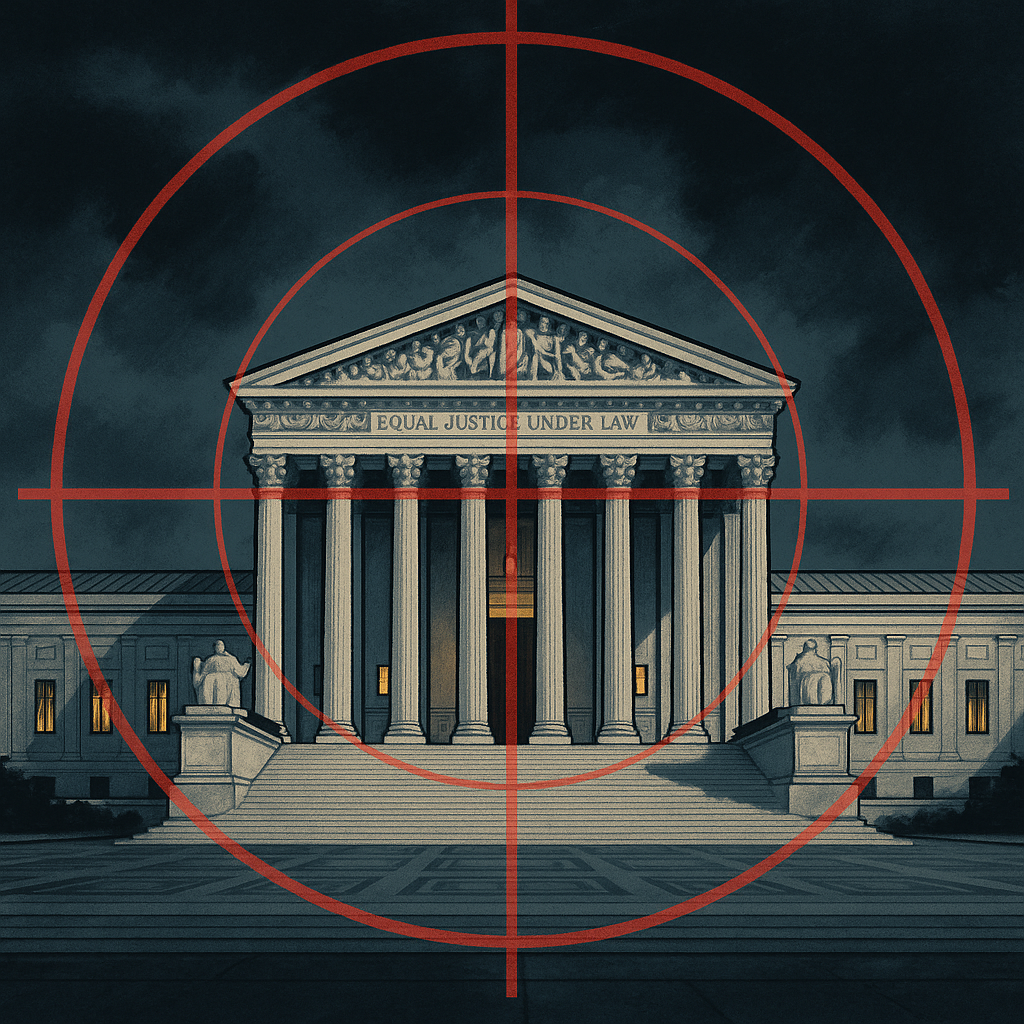Insights < BACK TO ALL INSIGHTS
Flirting with Disaster: Kid Glove Treatment of an Assassination Attempt Sets Damaging Example
Flirting with Disaster: Kid Glove Treatment of an Assassination Attempt Sets Damaging Example
By: James Trusty
On a crisp October afternoon while the media focused on P Diddy’s high-profile New York sentencing, a less conspicuous—but more consequential—hearing took place in another federal courthouse, not far from the nation’s capital. Nichola Roske was sentenced for the attempted assassination of at least one Supreme Court associate justice.
On June 8, 2022, Roske flew across the country—California to Virginia—and then traveled by cab to the Maryland address of Supreme Court Associate Justice Brett Kavanaugh. Roske arrived armed with a laser-sighted handgun, knife, lock picking set, duct tape, hammer, crowbar, and tactical gear. In his on-line research before the cross-country flight, Roske searched for information on conservative justices, mass shooters, and techniques for hurting people with knives, including the question: “Does twisting or dragging a knife cause more damage?” He searched for countries that would not extradite to the U.S., Googled “insanity defense,” and told someone on Discord that he was aiming to kill three conservative justices so as to tilt the Supreme Court to the left.
When Roske approached Justice Kavanaugh’s house in the middle of the night, he was spooked by the presence of a couple of U.S. Marshals. Their protection had been provided as part of a half-hearted effort by Attorney General Merrick Garland to provide minimal protection to conservative justices being targeted by pro-abortion protestors while simultaneously refusing to enforce federal law against them for trying to intimidate the justices. Providentially, Roske’s worried sister called him around 1:17 a.m., and their 20-minute conversation resulted in Roske abandoning his attempt and calling 9-1-1 to self-surrender.
Roske’s political views seem to have struck a chord with the Biden-appointed federal judge. His murderous plan was entirely geared towards safeguarding abortion rights under Roe v. Wade after Justice Alito’s opinion in Dobbs had been leaked to Politico in early May 2022. Driving home the attractiveness of Roske’s political views was the recently discovered fact that he now wants to be called Sophie Roske, and Judge Boardman obligingly got the pronouns right throughout the hearing. The judge even fretted that Sophie might not get hormone therapy in prison.1 Not only did Judge Boardman accept Sophie’s choice, but she “factored” into her sentence that poor Sophie was doomed by Trump Executive Order to serve her sentence in a facility housing only men. Nicholas Roske would not have gotten the sentencing break, but Sophie knew how to push the identity button that gets her out of prison early. The judge gave lip service to the “reprehensible” nature of the crime but quickly turned to the fact that Roske gave up on the plot once he saw armed marshals. In the judge’s eyes, giving up equated to cooperation with law enforcement, and worthy of even more lenient treatment.
Judge Boardman’s brief history as a District Court judge2 certainly supports the inference that she would sympathize with Roske’s leftist politics. In 2023, Judge Boardman rejected the request of a number of Montgomery County families to enjoin the School Board’s refusal to allow parents to opt their kids out of LGBTQ book discussions. The Supreme Court eventually overturned her ruling in a 6–3 decision this summer. She was also the first District Court judge in the country to grant a nationwide preliminary injunction against Trump’s birthright citizenship Executive Order. She also enjoined several major federal agencies from disclosing personal information to the Department of Government Efficiency (“DOGE”).3 Fair to assume she is high on the favorability scale for those pursuing a liberal or leftist agenda.
The attempted assassination charge carries a potential life sentence. The sentencing guidelines, an important but non-binding component of the federal sentencing process, called for 360 months to life as the appropriate sentence. The prosecution urged the Court to stick within those guidelines. The defense asked the judge to ignore the terroristic nature of the offense and the applicable sentencing guideline range, urging only eight years of imprisonment. Judge Boardman imposed a sentence of 97 months, apparently adding a month to the defense request as a way of “compromising” between 96 months and 360 months or more. Her sentence is nearly 22 years below the low end of the sentencing guidelines.
The only good news here is that the U.S. Attorney’s Office for Maryland can appeal the sentence as being an unreasonable one. Appellate courts typically allow for a lot of discretion at sentencing, but this may be the unusual case where the 4th Circuit—or perhaps ultimately the Supreme Court—once again takes Judge Boardman to task for poor judgment. Even before the soft treatment of Nicholas/Sophie Roske, a copycat loon invoked Roske’s name while threatening to shoot Justice Kavanaugh in the head. Seeing this travesty of injustice as it played out in Maryland will only encourage other loons to slaughter those who stand opposed to their radical ideology. This judge’s leniency is a bad gamble and a horrible signal that premeditated assassinations that strike at the heart of our constitutional institutions can be largely excused if you land on the right activist judge.
-
She was confirmed 52–48, with Senators Graham and Collins breaking ranks from the Republicans to support her confirmation. Senate Roll Call Vote ↩





